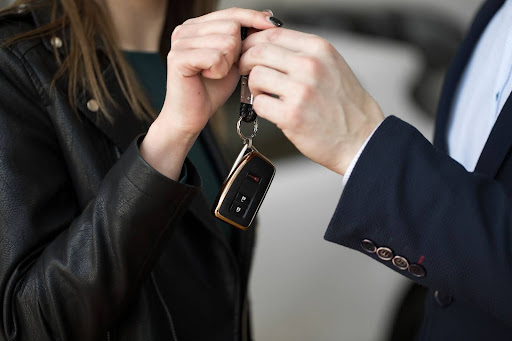I recently went to buy a truck. Needless to say, I was excited. Okay, I was beyond excited to get into a new vehicle. I had done all the online research and finally decided on the one I wanted (of which there were only a select few available).
With bated breath, I drove half an hour to the Ford dealership. Cautiously stepping out of my vehicle, I wondered how long it would take for the first salesperson to strike up a conversation with me. If you know salespeople at dealerships like I do, you’d know it wasn’t long.
I was introduced to a nice-looking young man, smartly dressed. We’ll call him ‘Westin’. He was a sharp lad, quick to find me a place to sit, offer me water, and locate the vehicle I was looking for in two shakes of a lamb’s tail. He cared about my comfort, valued my time, and wanted to establish trust. All of these things are good.
After I provided him with copies of my driver’s license and insurance, we were ready to go for a test drive. Along the ride, I learned some things about Westin’s family history, how he wound up in the great state of Colorado, and even what kind of personal car he drove (it was not a Ford). I learned a little about his goals, dreams, and who he saw himself becoming. In business and marketing parlance, this all went to the like-know-trust factor.
We returned to the dealership and parked the truck, went inside, and sat down to talk numbers. While many might prefer to gnaw off their own arm, this is actually my favorite part of car buying. Westin went back and forth to his managers with a few different ideas and finally landed on a price that was in the general ballpark of where I needed to be. I told him I needed to speak with the bank and that I would be back in touch the following day. Truck sold, right?
Wrong.
The smart, trust-earning young man uttered those words that can reverse any sale, undo any purchase, and drive away any willing client. “We have several people interested in this particular truck who are coming to look at it later today.”
Don’t do that, man, I thought to myself. I’m smarter than that. Now, he has rushed me, pressured me, undermined my intelligence, and lied to me. Truck no longer sold.
Westin didn’t want me to leave to chat with the bank. He wanted to make the sale right then and there, with the dealership’s financing, and he was willing to lie to achieve his goal. Needless to say, this is not the way to establish trust with a new customer
Don’t Lie to People
How did I know no one else was coming to look at the truck? Because once I started balking at the lie, Westin promptly put a dealer tag on it and sent me home in it for the afternoon—a familiar tactic known as “puppy dogging,” whereby you send the vehicle home with the potential customer to fall in love with it. Would anyone who was telling the truth about having it booked for showings all afternoon do that?
No. No, they wouldn’t.
I did take the truck home. It sat in the driveway for about an hour before the taste in my mouth grew so sour that I got back in, unsynced my phone from the stereo system, and headed back to the dealership, where I placed the keys gently on Westin’s desk.
You weren’t honest with me, I thought as I turned to walk out of the dealership. My aversion to being lied to might be something someone else would overlook in light of the excitement of a new car. To me, however, it means my relationship with that product started out based on a lie. I’m sorry, no.
Go Ahead and Own Your Mistakes
As a professional, I get it. None of us want to fail, at business or at life. In fact, we want to be downright perfect. The problem is, we’re human. We mess up. Even if we have a factory full of magical robots that AI their way almost flawlessly through each and every order, there is bound to be a booboo at some point, because we humans programmed the magical robots to begin with.
In business as in the rest of life, you have to be honest about your mistakes. I know it sounds awful and feels counterintuitive, but this can actually be a golden opportunity. This is exactly the scenario you need in order to establish trust with your client or customer! Here at The Cognitive Creative, we have actually gotten better email open rates on emails with “Oops, we made a mistake” in the subject line than we have on all others—by far.
That subject line tells people that, not only were we still checking ourselves after the initial email was sent, but we were willing to admit we were human and that we had made an error. That honest transparency makes us more approachable, and it will make you more approachable, too.
After all, who enjoys doing business with a robot? (I’m looking at you, Help Desk Bot.) Most of us want a person we can trust at the helm of our business exchanges.
What I Ordered and What I Got
I recently watched a YouTube series titled “What I Ordered and What I Got.” Needless to say, the results were hideous and, okay, sometimes hilarious. If I learned anything from these videos, it’s A) Don’t buy an elaborately decorated cake online, and B) If it seems too good to be true, it probably is.
Unless you are a purveyor of ornate cakes, item B is what pertains to you, the business owner. You want to ensure honesty and transparency with your client or customer, and a simple way to do that is to not sell things that are too good to be true. Your goal should be to provide quality products and services at fair prices that you can stand by.
You want to be competitive, sure; but undervaluing your services or products can backfire and look like a huge red flag for some customers. Even if your mini-Chuck Norris statues look in person exactly like they do online, if your price is too low, you may be unconsciously telling your buyer to beware by appearing too good to be true.
The key is to know the value of your products or services and not be greedy. People who thrive in business do so because they work hard, so don’t be afraid to lower your markup to a reasonable price and add some more hustle to your game to meet your bottom line.
Conclusion
If the basis of all business is establishing a solid like-know-trust factor, it seems pretty self-explanatory why honesty is imperative. Even if you believe your services or products speak for themselves, they aren’t going to sell themselves without a human assist. People need someone to help them see how your service or product solves a problem for them. Do you want someone you don’t trust to help you with a problem? Probably not.
Don’t be afraid to be human! Make your mistakes, but own up to them, be honest and be ready to make it right with your clients. People are generally understanding and will trust someone who admits their mistakes and takes steps to correct them. What you don’t want is for them to discover your mistake later and learn that you did nothing to correct it.
It’s imperative to know the value of what you’re selling and stay within reasonable limits on pricing. Going outside those bounds leads to bad reviews or undervalued services, which can subvert your sales. Neither of those is good for you. Neither is ending up on the wrong end of a YouTube consumer series.
There’s a lot more to honesty and ethics in marketing, but these are some of the basics. Be honest. Be fair (to yourself and others). And don’t be afraid to be human! After all, that’s one trait you’re kinda stuck with.


0 Comments